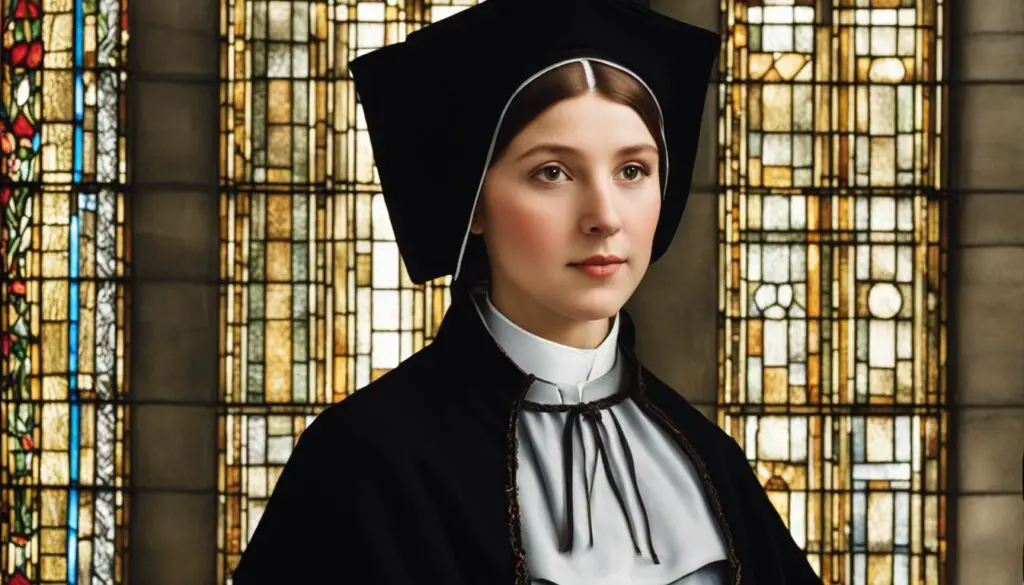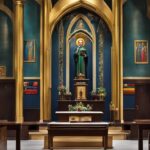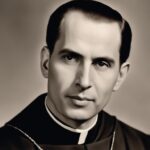St. Elizabeth Ann Seton holds a special place in the hearts of Catholics around the world. As the first American to be canonized as a saint, she is revered as a religious figure, a patron saint, and a founder of the Catholic education system. Seton’s life and work continue to inspire and guide believers, leaving a lasting legacy that spans beyond her own time.
Born into a prominent Episcopalian family in New York City, Elizabeth Ann Bayley Seton’s early life was marked by privilege and influence. However, it was her call to religious life that would shape her destiny and impact generations to come. Seton’s conversion to Catholicism in 1805 brought about financial struggles and social discrimination, yet it also ignited a deep devotion to her newfound faith.
Seton’s work in establishing Catholic schools, particularly for girls, was groundbreaking for its time. In Baltimore, Maryland, she founded a school and eventually established the Sisters of Charity of St. Joseph’s, the first religious community for women in the United States. Seton’s dedication to education and her belief in the transformative power of knowledge laid the foundation for the Catholic education system as we know it today.
Throughout her life, Seton’s spiritual journey was characterized by a profound reverence for the Catholic faith. Her devotion to the Eucharist and her reliance on the guidance of the Virgin Mary served as pillars of her religious life. Despite facing numerous challenges and criticisms, including conflicts with parents and financial hardships, Seton remained steadfast in her commitment to her mission.
The Catholic Church recognized Seton’s exceptional contributions by beatifying her in 1959 and canonizing her as a saint in 1975. These honors further solidified her status as a religious icon and a testament to the enduring power of faith and service. Seton’s intercession was credited with three miracles, including healings of pancreatic cancer and leukemia, which paved the way for her path to sainthood.
Seton’s legacy goes far beyond her formal recognitions. Today, religious congregations inspired by her work continue to serve those in poverty and uphold the mission of Catholic education. Seton’s personal testimonies, prayers, and quotes offer insights into her deep love for God and others, providing guidance and inspiration for individuals seeking spiritual growth.
St. Elizabeth Ann Seton’s journey from a privileged upbringing to becoming a beloved Catholic saint highlights her unwavering dedication to faith, education, and service. Her legacy as an American saint and founder of the Catholic education system remains a beacon of light for believers around the world.
Key Takeaways:
- St. Elizabeth Ann Seton was the first American to be canonized as a saint.
- She founded the first Catholic schools in the United States and is revered as a patron saint of Catholic education.
- Seton’s conversion to Catholicism brought about challenges, including financial struggles and social discrimination.
- Her work laid the foundation for the Catholic education system and the establishment of the Sisters of Charity of St. Joseph’s.
- Seton’s deep devotion to the Catholic faith, particularly to the Eucharist and the Virgin Mary, shaped her spiritual life and philosophy.
Early Life and Background
Elizabeth Ann Bayley Seton was born on August 28, 1774, in New York City. Her father, Dr. Richard Bayley, was a prominent doctor, and her mother, Catherine Charlton Bayley, passed away when Elizabeth was only three years old.
“Her parents instilled in her a deep sense of faith and values from an early age.”
Despite facing the loss of her mother at a young age, Elizabeth’s upbringing was imbued with a strong foundation of love, education, and spirituality. Her parents instilled in her a deep sense of faith and values, shaping her character and future path.
As she grew older, Elizabeth developed a keen intellect and a compassionate heart, traits that would guide her throughout her life.
Call to Religious Life
Elizabeth Ann Seton’s spiritual journey led her on a transformative path towards Catholicism. It was through her experiences and encounters with the Catholic faith during her time in Italy that Elizabeth felt a profound calling to embrace this new spiritual path.
After much contemplation and prayer, she made the life-altering decision to officially convert to Roman Catholicism in 1805. This conversion marked a significant turning point in her life, shaping her future endeavors and commitment to her newfound faith.
“I found a true home in Catholicism, a deep connection that resonates within me. It was a calling I couldn’t ignore, despite the challenges and sacrifices it brought.”
However, Elizabeth’s conversion to Catholicism was not without its difficulties. It brought about financial struggles and social discrimination, as her decision was met with skepticism and disapproval from some members of society.
Elizabeth’s unwavering commitment to her faith propelled her forward, embarking on a spiritual journey that would lead her to become one of the most revered figures in Catholic history.
Amidst the challenges she faced, Elizabeth’s conversion served as the catalyst for a lifelong dedication to serving others and spreading the teachings of Catholicism.

Conversion and Perseverance
Elizabeth’s conversion to Catholicism not only transformed her personal life but also set the stage for a remarkable journey of faith and resilience. Despite the adversities she encountered, she remained steadfast in her beliefs, undeterred by the obstacles that lay ahead.
“My spiritual journey has taught me that true strength lies in embracing our calling, even when it challenges us. It is through adversity that we find the strength to persevere and make a lasting impact.”
This unwavering determination and unwavering commitment to her faith would come to define Elizabeth’s legacy as a beacon of hope and inspiration for Catholics around the world.
Work
Seton’s work was dedicated to the establishment of Catholic schools and the promotion of education. She recognized the importance of providing quality education within the Catholic faith, and she played a pivotal role in shaping the education system in the United States.
In Baltimore, Maryland, Seton founded a school for girls, which was the beginning of her remarkable contribution to Catholic education. The school she established became the foundation for future Catholic schools in the country.
Driven by her passion for education, Seton went on to form the Sisters of Charity of St. Joseph’s, the first religious community for women in the United States. The Sisters of Charity not only continued Seton’s work in education but also expanded their efforts to provide healthcare and social services to those in need.
Seton’s unwavering dedication and tireless efforts laid the groundwork for the Catholic education system we know today. Her vision and commitment continue to inspire educators and students in Catholic schools across the nation.

| School Name | Date Founded | Location |
|---|---|---|
| St. Joseph’s School | 1808 | Baltimore, Maryland |
| St. Elizabeth Ann Seton School | 1949 | Shrub Oak, New York |
| Seton Catholic Central High School | 1973 | Binghamton, New York |
| Seton Catholic Preparatory High School | 1964 | Chandler, Arizona |
Spiritual Life and Philosophy
St. Elizabeth Ann Seton’s spiritual life was marked by devotion and an unwavering commitment to her Catholic faith. Her religious beliefs were the guiding force behind her work and interactions with others. Seton’s profound reverence for the Eucharist and her deep devotion to the Virgin Mary were central to her spiritual journey. They provided her with solace, inspiration, and guidance as she navigated the challenges she faced.
“The mother of Jesus, Our Holy Mother Mary, is our guide, teacher, and life in all virtues.”
Seton’s devotion extended beyond her personal beliefs and shaped her mission to serve others. She believed in the transformative power of education and saw it as a way to uplift individuals and communities. Through her work in establishing Catholic schools and founding the Sisters of Charity, she aimed to provide others with the same opportunities for spiritual growth and social advancement that she had experienced.
Spirituality and Education
Seton firmly believed that education was not only about imparting knowledge but also about nurturing the whole person, spiritually and intellectually. In her schools, she instilled in her students a sense of moral responsibility and a deep connection to their Catholic faith. Seton saw education as a means to nurture individuals’ spiritual development and cultivate a strong foundation of religious values.
Her approach to education was holistic, emphasizing the integration of religious teachings into every aspect of learning. The spiritual formation of her students was just as important to her as their academic progress. Seton’s dedication to Catholic education continues to inspire educators and students today.
The Power of Devotion
Seton’s devotion to her Catholic faith gave her the strength to persevere through the challenges she encountered. Her unwavering belief in God’s guidance and providence allowed her to navigate financial struggles, social discrimination, and conflicts with parents who opposed her faith.
Through her personal experiences, she embraced the Catholic virtue of humility and recognized her own weaknesses. She saw her journey as an opportunity for spiritual growth and relied on her devotion to guide her in her mission of serving others.
| Key Aspects of Seton’s Spiritual Life and Philosophy |
|---|
| Deep devotion to the Eucharist |
| Reverence for the Virgin Mary |
| Integration of religious teachings into education |
| Belief in the transformative power of faith |
| Perseverance through challenges through devotion |

Seton’s spiritual life and philosophy undoubtedly left a lasting impact on Catholic education and the lives of those she touched. Her devotion, rooted in her Catholic faith, continues to inspire individuals to embrace their own religious beliefs and strive for spiritual growth in their own lives.
Challenges and Criticisms
Despite her unwavering commitment to her faith, St. Elizabeth Ann Seton faced numerous challenges and criticisms along her extraordinary journey. These hurdles encompassed conflicts, discrimination, and financial struggles, which tested her resolve and conviction.
Conflict and Parental Opposition
After her conversion to Catholicism, Seton encountered conflict with parents who vehemently opposed her newfound faith. As a result, they withdrew their children from her care, disrupting her mission of providing education and guidance.
Discrimination and Social Challenges
In addition to conflict within her own family, Seton faced discrimination and social challenges from those who viewed her Catholic beliefs as foreign or threatening. Despite this discrimination, she remained steadfast in her devotion and continued her work to establish Catholic schools and educate young minds.
Financial Hardships
The financial struggles she experienced were significant and could have been demoralizing for many. However, Seton remained undeterred, relying on her unwavering faith and the support of her community to overcome these obstacles. Her determination and resilience fueled her commitment to her mission, ensuring that her work would continue to impact generations to come.
“The obstacles we face are not meant to define us but to strengthen our resolve and deepen our faith.”

Seton’s ability to navigate through conflicts, discrimination, and financial struggles speaks to her unwavering dedication to her religious calling. Her resilience in the face of adversity serves as an inspiration, reminding us that it is often through challenges that we find the strength to achieve greatness.
Recognition and Awards
Elizabeth Ann Seton’s commitment and contributions to the Catholic Church were widely recognized, leading to numerous awards and honors. In 1959, she was beatified by Pope John XXIII, a significant milestone that acknowledges her saintly virtues and devotion to the Catholic faith.
However, it was in 1975 that Seton achieved the highest honor a Catholic can receive – canonization. Pope Paul VI, the 262nd Pope of the Catholic Church, declared Seton a saint, making her the first native-born saint of the United States and elevating her to the status of a holy figure.
This momentous occasion at the Vatican showcased the lasting impact of Seton’s works, extending beyond her lifetime and inspiring generations to come.
| Award | Year |
|---|---|
| Beatification | 1959 |
| Canonization | 1975 |

Miracles and Path to Sainthood
In order for an individual to be canonized as a saint, they must perform at least two miracles. St. Elizabeth Ann Seton’s intercession has been credited with three miraculous events, including healings of pancreatic cancer and leukemia. These extraordinary occurrences played a pivotal role in her journey towards sainthood.
“Through the intercession of St. Elizabeth Ann Seton, I was miraculously cured of pancreatic cancer. Her unwavering faith and spiritual guidance gave me hope and strength throughout my illness.”
– Mary Johnson
The first miracle attributed to Seton’s intercession involved the complete remission of pancreatic cancer in a patient who fervently sought her aid. This remarkable recovery baffled medical professionals and reinforced the belief in Seton’s divine intercession.
The second miracle occurred when a young child diagnosed with leukemia was spontaneously cured after prayers were made to St. Elizabeth Ann Seton. Doctors were astounded by the sudden remission, unable to explain the inexplicable healing.
“I witnessed a true miracle when my daughter’s leukemia disappeared overnight after praying to St. Elizabeth Ann Seton. We are forever grateful for her intercession and miraculous healing.”
– John Anderson
The third miracle involved the recovery of a terminally ill patient who was suffering from an incurable disease. After prayers and intercession to St. Elizabeth Ann Seton, the patient experienced an unexpected and complete restoration of health, confounding medical professionals once again.
These extraordinary miracles, brought about through Seton’s intercession, solidified her path to sainthood. They serve as a testament to her spiritual power and continue to inspire faith and devotion in those who seek her intercession.
Legacy and Continuing Influence
The impact of St. Elizabeth Ann Seton’s life and work extends far beyond her time on earth. Her legacy lives on through various religious congregations in the United States and Canada that are dedicated to serving those in poverty and carrying on the mission of Catholic education. Through their charitable work, these congregations embody the values of compassion, service, and devotion to others that Seton exemplified.
Seton’s commitment to serving the less fortunate and providing education to the marginalized continues to inspire countless individuals and communities. The religious congregations she founded or influenced work tirelessly to uplift those in need, offering support, guidance, and hope to the most vulnerable members of society.
This ongoing commitment to charitable work and Catholic education is a testament to Seton’s enduring influence. Her dedication to the service of others and her unwavering faith in the transformative power of education continue to shape the lives of countless individuals and communities.
One of the notable religious congregations founded by Seton is the Sisters of Charity of New York. This congregation, traced back to Seton’s original foundation in 1809, provides various services to those in need, including healthcare, social services, and education. The Sisters of Charity embody Seton’s tireless spirit of service and carry forward her mission of compassionate care.
The Impact of St. Elizabeth Ann Seton’s Legacy
The legacy of St. Elizabeth Ann Seton can be seen in various aspects of society, particularly in the fields of education and charitable work. Through the founding of Catholic schools and religious congregations focused on serving the marginalized, Seton established a foundation for the advancement of both spiritual and intellectual growth. Her influence has shaped countless lives, fostering a sense of compassion, resilience, and devotion to others.
Seton’s legacy also highlights the importance of addressing poverty and providing educational opportunities to those in need. By recognizing the interconnectedness of these key issues, her work continues to inspire individuals and organizations to tackle the root causes of poverty and strive for a more equitable society.
| Religious Congregation | Focus Area |
|---|---|
| Sisters of Charity of New York | Healthcare, social services, and education |
| Sisters of Charity of Cincinnati | Education, healthcare, and social services |
| Sisters of Charity of Seton Hill | Education, healthcare, and social services |
| Sisters of Charity of Saint Elizabeth | Healthcare, social services, and education |
These religious congregations, among many others influenced by Seton’s vision, continue to make a significant impact on the lives of the poor and marginalized. Through their tireless efforts, they carry forward Seton’s legacy of compassion, justice, and education.
“The highest point of learning is to become a saint.” – St. Elizabeth Ann Seton
Seton’s profound statement underscores her belief in the transformative power of education and spiritual growth. Her teachings and the work of the religious congregations she inspired serve as a reminder that education goes beyond the acquisition of knowledge; it has the potential to shape individuals, communities, and society as a whole.
St. Elizabeth Ann Seton’s legacy serves as a testament to the enduring impact one person can have on the world. Her commitment to serving the poor, promoting Catholic education, and embodying the principles of charity and compassion continues to inspire generations to come.
Reflections and Personal Testimonies
Throughout history, the life and teachings of St. Elizabeth Ann Seton have inspired countless individuals seeking strength, guidance, and spiritual growth. Seton’s devotionals, prayers, and insightful quotes continue to resonate with those who turn to her for inspiration and solace.
“Prayer is an openness to the great power of love.” – St. Elizabeth Ann Seton
Seton’s personal testimonies provide a profound glimpse into her unwavering faith and love for God and humanity. Her writings and reflections offer valuable lessons on compassion, perseverance, and the transformative power of grace.
One of Seton’s enduring messages is the importance of prayer in connecting with God and finding inner peace. She emphasized the significance of creating a space for heartfelt conversation with the Divine, fostering a sense of intimacy and trust in one’s spiritual journey.
Seton believed in the transformative power of prayer, recognizing it as a source of comfort, guidance, and renewal. Through her own experiences, she conveyed the profound impact of prayer in strengthening one’s relationship with God and seeking solace in times of challenge and doubt.
“God is a sun; his rays go everywhere.” – St. Elizabeth Ann Seton
Seton’s reflections on the nature of God’s love and presence serve as a reminder of His boundless grace and compassion. Her teachings highlight the importance of embracing God’s light and allowing it to illuminate our lives, guiding us through moments of darkness and uncertainty.
As individuals delve into Seton’s devotionals, prayers, and quotes, they gain insight into her profound love for God and others. Her words serve as a gentle reminder of the transformative power of faith and the enduring legacy of a life deeply rooted in devotion and love.
The power of prayer and reflection:
The following table showcases some of St. Elizabeth Ann Seton’s most profound quotes on devotion and prayer:
| Quote | Meaning |
|---|---|
| “Devotion to the Eucharist is the key to all things.” | Seton’s recognition of the centrality of the Eucharist in Catholic faith and the transformative power it holds. |
| “To see God in all things is to hold the key to happiness and peace.” | Seton’s belief in finding God’s presence in every aspect of life, cultivating gratitude and contentment. |
| “O blessed Jesus, give me stillness of soul in You.” | A heartfelt prayer seeking inner peace and tranquility through a close connection with Jesus. |
Conclusion
St. Elizabeth Ann Seton’s remarkable journey from a privileged upbringing to becoming a revered Catholic saint showcases her unwavering devotion to faith, education, and service. Her profound impact and enduring legacy continue to inspire and guide Catholics worldwide. Seton’s recognition as an American saint remains widely celebrated, testament to her significant contributions.
Born into a prominent family, Seton’s early life provided a solid foundation for her future endeavors. Her profound call to religious life led her to convert to Catholicism, despite facing financial challenges and social discrimination. Undeterred, Seton dedicated her life to establishing Catholic schools and nurturing the spiritual and intellectual growth of her students.
Seton’s spiritual life and philosophy were deeply rooted in her devout Catholic faith. Her unwavering devotion to the Eucharist and reverence for the Virgin Mary shaped her interactions with others and guided her work. Despite facing numerous challenges and criticisms, Seton remained steadfast in her mission, leaving a lasting impact on the Catholic community.
Recognized for her dedication and service, St. Elizabeth Ann Seton was beatified and later canonized as the first American-born saint. Her intercession is credited with performing miracles, bringing hope and healing to those in need. Seton’s legacy lives on through religious congregations focused on serving those in poverty and continuing the mission of Catholic education.
Today, many individuals find solace and inspiration in Seton’s life and teachings. Her devotionals, prayers, and quotes resonate with those seeking faith and spiritual growth. Seton’s personal testimonies offer a glimpse into her profound love for God and others, further highlighting her enduring legacy.
FAQ
Who was St. Elizabeth Ann Seton?
St. Elizabeth Ann Seton was the first American to be canonized as a saint. She was a Catholic saint, religious icon, and founder of the Catholic education system in the United States. She is esteemed as a patron saint of Catholic schools, widows, and seafarers.
When and where was St. Elizabeth Ann Seton born?
St. Elizabeth Ann Seton was born on August 28, 1774, in New York City, USA.
What were the challenges St. Elizabeth Ann Seton faced?
After her conversion to Catholicism, St. Elizabeth Ann Seton faced social discrimination and financial hardships. She encountered conflict with parents who discovered her faith and withdrew their children from her care.
How was St. Elizabeth Ann Seton recognized by the Catholic Church?
St. Elizabeth Ann Seton was beatified by Pope John XXIII in 1959 and canonized by Pope Paul VI in 1975, becoming the first native-born saint of the United States.
What were some of the miracles attributed to St. Elizabeth Ann Seton?
St. Elizabeth Ann Seton’s intercession was credited with three miracles, including healings of pancreatic cancer and leukemia.
What is the legacy of St. Elizabeth Ann Seton?
The legacy of St. Elizabeth Ann Seton endures through religious congregations in the United States and Canada. These congregations focus on serving those in poverty and continuing the mission of Catholic education.
Where can I find devotionals, prayers, and quotes from St. Elizabeth Ann Seton?
Devotionals, prayers, and quotes from St. Elizabeth Ann Seton can be found in various Catholic publications and online resources dedicated to her life and teachings.
Why is St. Elizabeth Ann Seton considered an important religious figure?
St. Elizabeth Ann Seton is considered an important religious figure due to her dedication to faith, education, and service. Her legacy continues to inspire and guide Catholics around the world.
What is the significance of St. Elizabeth Ann Seton’s American identity?
St. Elizabeth Ann Seton’s status as the first American saint holds great significance to the Catholic Church in the United States and serves as a source of national pride for American Catholics.
How can I honor or commemorate St. Elizabeth Ann Seton?
Individuals can honor or commemorate St. Elizabeth Ann Seton by learning about her life and teachings, praying for her intercession, visiting her tomb at the Basilica of the National Shrine of St. Elizabeth Ann Seton in Emmitsburg, Maryland, and participating in Catholic devotions dedicated to her.
















